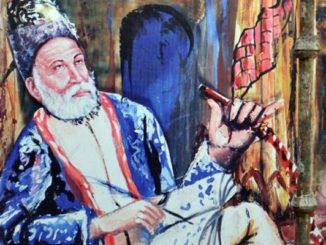
Reflection of Colonial Mind-set in Ghalib’s Poetry
by, Meraj Rana
Derrida says that literary criticism of every age is structural in its essence. His words are:
“This is why literary criticism is structuralist in every age, in its essence and destiny”(1)
(Writing and Difference, Jacques Derrida,p.5, Routledge, London 1978)
Deconstruction involves a method of close reading that exposes the contradictions, gaps, and tensions within texts. Rather than seeking to uncover an author’s intended meaning or a text’s inherent truth, deconstructive reading focuses on the play of language and the instability of meaning. It does not aim to provide definitive answers but rather to open up new possibilities for interpretation. Derrida extends the principles of deconstruction to ethics and politics, challenging dominant power structures and hierarchies. Deconstruction exposes the ways in which language is complicit in the perpetuation of injustice and oppression, highlighting the need for ethical vigilance and political intervention.
When we study Ghalib’s poetry, Derrida’s philosophical point starts to shepherd us step by step. This means that the predominant idea of Derrida’s deconstructive concept of literature is that language does not only create meaning but invokes ambiguity and uncertainty. He argues that language is characterized by a heterogeneous structure in which meaning is mediated through deferred and secondary signs. So language distinguishes between indicative and deferential meanings. And in the process, language continually postpones any final closure:
روی سیاہ خویش ز خود ہم نہفتہ ایم
شمعِ خموش ِکلبئہ تارِ خودیم ما
(We have cloistered our black face even from ourselves. We are the extinguished lamp of our house. Seeing an extinguished lamp in a dark house, one feels that the lamp is hiding its face. And so it is hidden. The reason for sitting down is that it could not illuminate the dark house.)
In this couplet, the poet describes the nonfeasance to carry out the life goal which can be associated with an individual as well as a society.
Ghalib’s above-mentioned couplet disapproves an inexpugnable perspective of meaning. The first reversal of the couplet is made possible by the binary opposition of “light” and “darkness.” And which accentuates Derrida’s point of deferring meaning. The second rejection is ensured by the metaphor of “house”. This means that here “house” changes its usual meaning of ‘comfort’ and becomes a sign of anxiety and despair. Here it is also to be remembered that in this couplet, the lamp is not simply called a lamp, but it is called a silent lamp. Silent lamp means extinguished lamp. The extinguished lamp here may also be a metaphor for the situation created by colonial thought. Ghalib describes his internal situation in another couplet:
گوشہ گیرا نیم و محو پاس ناموس خودیم
آبروئی ما گداز جوہر رفتار ما
(We are cornered and sitting in segregation, lost in our honor. Our honour is secured in this corner. That is, the essence of our velocity has become a source of our honour.)
There are several possibilities of elucidations in Ghalib’s above couplet. It means that the different connotations of this couplet can be extrapolated from the internal references of the poet. But one point of the mentioned couplet is also conspicuous in the external contexture. Here the poet’s sequestration and solitude represent his sedulous life and this life also proves the rattle of his society which has now utterly vanished. The noise of the society is a rugged reference to the political situation which has an instantaneous outcome on the internal existence of the poet.
Ghalib here, through poetic language, according to Derrida, invokes many gaps and tensions that stand for the reader to create an alternative text. A text dominated not by the author but by the heterogeneity of the reader. Therefore, in this situation, the formal distinction between the text and the secondary text of existing and non-existing meaning is lost, thereby refuting the conventional meaning of the text itself. As in Ghalib’s discussed couplet, the poet’s incarceration in a corner damn well shows the piteous human condition of the noise and trepidation of the outside world. Ghalib has described his political perturbation and his isolation in a letter to Khwaja Ghulam Ghaus Bekhabar:
“When Lord Bahadur Sahib arrived in Calcutta. I sent the ‘qasida’ which came with the order that you should not send me these things again. I became disenchanted and stopped meeting the officers of the city”
(Uud-i-Hindi, Mirza Ghalib, p.131 )
This means that here the poet shows the colonial anguish by turning his individual pathos into a collective torment, which is demonstrated by the word ‘the essence of speed’ used in the second line (misra). The ‘essence of speed’ is a metaphor for dynamism and would emphasize the functionality of Ghalib. But due to external fear, this activity of the poet has been frozen.
Frantz Fanon (1925-1961) also draws the same conclusion. He concludes that literature is a means of documenting the actual experience of colonial oppression and imagining self-determination. He discusses the relationship between literature and culture in his essay “On National Culture” (1959). Fanon emphasizes that the struggle against colonialism requires a national culture that reflects the aspirations and values of an independent nation. Ghalib writes in another letter to Khwaja Ghulam Ghaus Bekhabar:
“In the year of revolt, you sympathized with the rebels, why do you want to meet the government now? The next day I wrote a letter to him in English, in which it was written that my sympathy with the rebels is a rumor. I wish for an investigation to prove my innocence.” (Uud-i-Hindi, Mirza Ghalib, p.130)
First of all, Ghalib’s discussed letter expresses a desire to replenish the gap between the feudal elite (of which Ghalib himself a representative) and the enduring colonial system that had developed after 1857. And secondly, it appears that Ghalib was so appalled by the complexities of the colonial situation of his time that he was amenable to accept its linguistic prejudice as a positive value. Ghalib writing a letter to the British government in English is also a strong instance of evidence that he wants to end the political deadlock between the two classes. Therefore, Ghalib considers concerted, comprehending and a dialogue necessary in this process.
This communication process is the kernel of Habermas’s (1929-) philosophy. He states that (hu)man is elementally a communicative creature and the validity of (their) actions depends on the inter subjectivity derived from mutual discourse which in turn constitutes the public sphere. Habermas further states that the public sphere is a discursive space where people come together for rational and critical discussions of common concern, freed from the influence of state power and economic interests, to form public opinion.
Ghalib’s letter clearly shows his sensitivity towards the society, so it is not possible that this sensitivity was not expressed in his poetry. A close reading of Ghalib’s poetry also reveals a meaning that expresses Ghalib’s political and economic consciousness:
میل ماسوئی وی و میلش بسوئی چوں خودی است
آرد از خود رفتنش ناگہ با استقبال ما
(We are attracted to her and she is attracted to another beautiful person like herself. This temptation will suddenly come to greet us someday.)
In this couplet, the poet addresses someone and sets out his immersion towards him. Obviously, this is a couplet of Ghazal, so here the word ‘someone’ means beloved. The meaning of the couplet is that the poet has been often expounding his love for the beloved and she is constantly enticed to another beauteous person of her own kind. But ‘she’ here can also refer to the colonial system and its attractive situation.
If we take ‘her’ to mean the colonial system here, it can also mean that the poet is willing to reconcile with the colonial system, but that system is attracted to the other center of political power. But the poet also hopes that one day colonialism will damn well entail the traditional feudal system, which Ghalib mentions in his above adduced letter.
Ghalib’s poetry, especially his Persian poetry, reflects the metaphorical expression of mental and physical impediment arising from the colonial regime. For example, his couplets can be seen:
شمعم ز روسیاہیِ داغِ جبینِ خلوت
چنگم ز بی نوائی ننگِ بساط محفل
(My candle is a stain on the forehead of my solitude because of its lack of light, and because of its soundlessness the lute is a barrenness for the gathering of joy.)
غالب رسیدہ ایم بہ کلکتہ و بہ مئے
از سینہ داغ دوری احباب شستہ ایم
(Most likely we reached Calcutta and dripping away the scars of the separation of friends by drinking alcohol.)
بی پردہ تاب محرومی را زما مجوی
خوں گشتن دل از مژہ و آتشیں شناس
(Don’t expect us to tell you how we keep our secrets in our bosoms. Our hearts have bled to conceal this secret. It will not be resolved by asking us. It will be known by the bloody tears that are on our eyelids and sleeves.)
Ghalib’s first couplet describes the intensity of loneliness. The loneliness that arises within an individual when he is part of a larger external scuffle. Such isolation is usually revelatory because internal accountability is possible only through disclosure. Which in turn creates a path of reversion. This retreat can be from materialism to spirituality and also from spirituality to materialism. In the first line, Ghalib mentions the murkiness of his candle.
Here, the candle is a metaphor for his own life, which is now without light, the black spot on his lonely forehead has become conspicuous due to the lack of light from the lamp. Which is further implied by the second line. Here the lute is also a metaphor for life, which is now empty of song and sound. It means that the lute’s dissonance is the reason for the destruction of the party. Ghalib’s couplet can be interpreted in several ways, one of which relates to the colonial situation. If we understand the lamp here as a metaphor for collective life or a certain era, then the meaning of the couplet will be that after the stability of the colonial situation, individuals, society, values all became like the lamp that has lost its light.
Ghalib’s second couplet apparently describes the austerity of the journey to Calcutta, where the poet forgets the separation of his friends by drinking. But what was actually the strive of the poet with which the survival of his life was connected. Ghalib’s visit to Calcutta was to restore his family pension which had been suspended by the British Government for a long time. For Ghalib, the restoration of pension was originally meant to solve the existential deadlock.
Therefore, it can be said that in Ghalib’s poetry both the positive and negative values of the colonial mind are prominent, the main purpose of which was to end the deadlock between the colonial and eastern minds that arose after the first war of independence.




